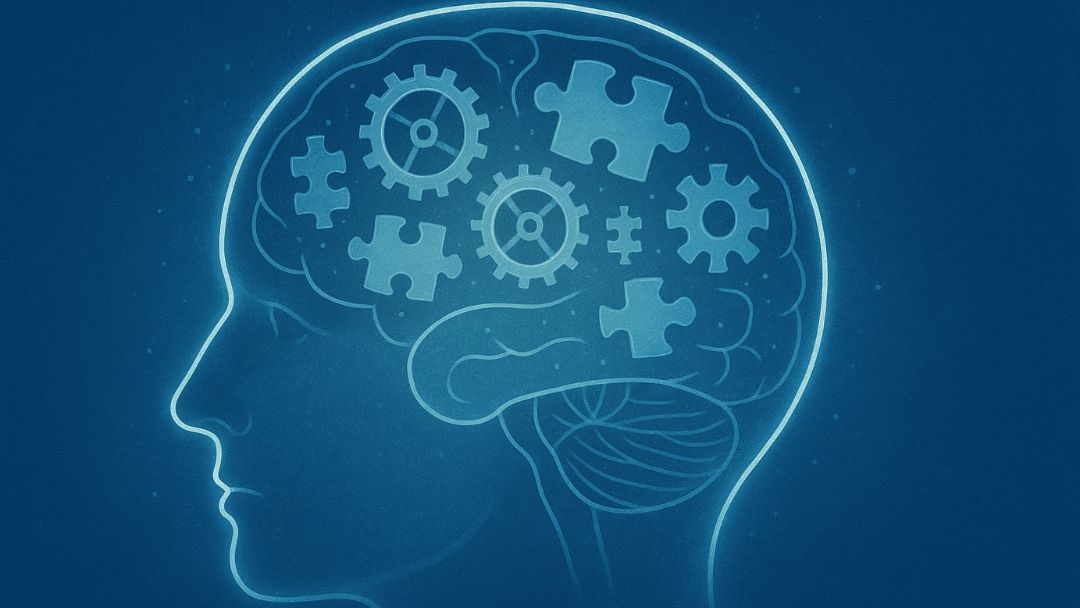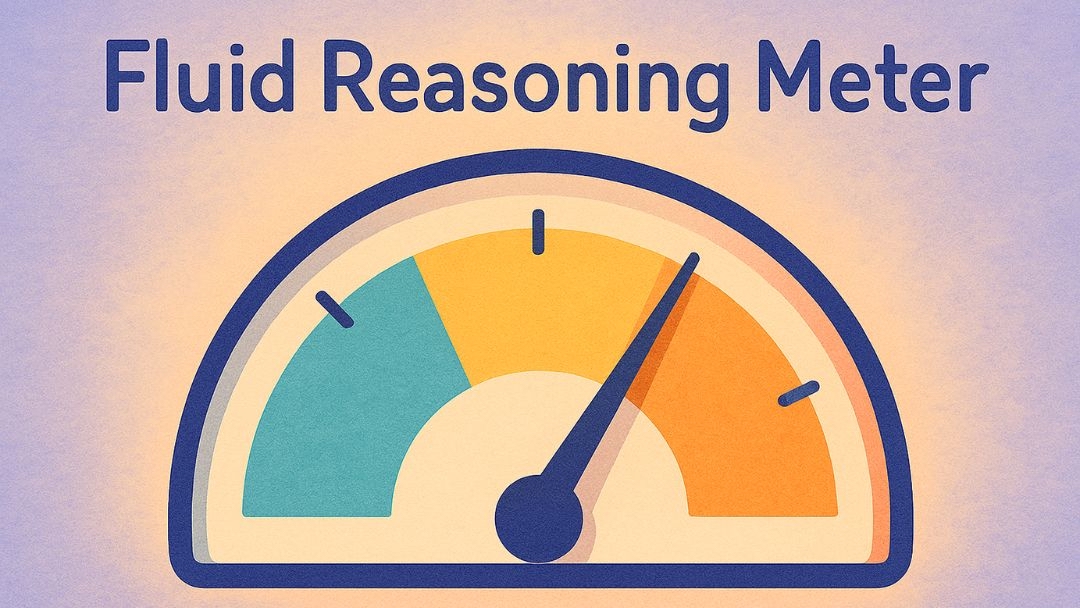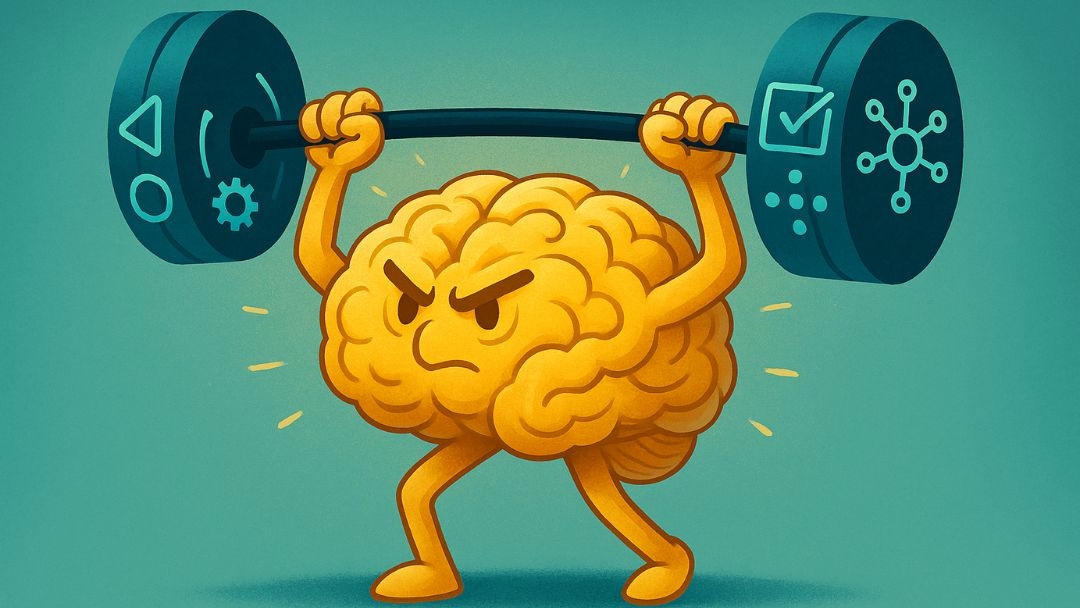Fluid Reasoning: The Thinking Skill You Use Every Day Without Realizing
Like a mental compass, fluid reasoning turns on when direction is lost — rerouting your thoughts, steadying your response, and guiding you through the unexpected. It’s the quiet skill behind your sharpest choices, your quick pivots, and the moments you surprise even yourself. Uncover the hidden mental ability that powers your everyday resilience — and how to grow it at any age.


Back
9 mins read
Have you ever tried assembling Ikea furniture without a manual? You flip the pieces around, squint at the parts, test a few options, fail, try again — and eventually, it clicks.
Genius? Not necessarily. But more likely, that was your fluid reasoning at work.
Fluid reasoning is your brain’s ability to solve new problems, make sense of unfamiliar situations, and spot patterns without relying on prior experience or instructions. It’s a mental skill that helps you think flexibly and figure things out in real time.
While some mental skills rely on memory or learned knowledge, like remembering your route home or that two plus two equals four, fluid reasoning is what you use when there’s no clear formula to follow. Solving puzzles, playing logic games, troubleshooting tech errors, or navigating an awkward social situation all rely on this ability.
That quiet mental work—the trial, the error, the sudden “aha!”—is powered by a thinking skill you use more often than you realize.
So what exactly is fluid reasoning, and why does it matter so much in everyday life?
Let’s break it down.
5 Ways Fluid Reasoning Helps You Succeed in Daily Life

You don’t need to be solving Rubik’s cubes or decoding spy messages to use fluid reasoning. This type of thinking kicks in during countless everyday situations—like figuring out why your Wi-Fi isn’t working, handling a last-minute schedule change, or navigating a tough conversation without a script.
Fluid reasoning is your ability to think on your feet, adapt to new situations, and make smart choices—even when there’s no clear answer or past experience to guide you. That’s what makes it one of the most valuable mental skills for navigating everyday life.
Here are five ways fluid reasoning shows up in daily life and helps you thrive:
1. Fluid Reasoning Helps You Solve Real Problems—Not Just Puzzles
Fluid reasoning serves as your brain’s “flexible thinking” tool. It helps you work through situations you haven’t encountered before by spotting patterns, ignoring distractions, and connecting ideas quickly.
For example:
- Troubleshooting a tech issue without a manual
- Figuring out the most efficient route in a new city
- Responding calmly to an unexpected crisis
This ability to think logically without relying on past knowledge is a key part of cognitive flexibility, which supports decision-making and resilience in unpredictable environments. It also shares common ground with what psychologist Robert Sternberg calls creative intelligence—the ability to navigate novel situations and generate effective solutions when there’s no clear roadmap.
Studies show that individuals with higher fluid reasoning scores tend to perform better in novel problem-solving tasks and adapt faster to changing demands.
2. Fluid Reasoning Shapes Academic and Learning Success
Fluid reasoning also plays a significant role in academic success. It’s not just about memorizing facts or recalling information, but about applying your thinking to solve new problems.
It helps when:
- Solving math problems that require logical deduction
- Understanding abstract relationships in science experiments
- Tackling visual puzzles or unfamiliar reading comprehension passages
Educators often assess these skills using tools like Raven’s Progressive Matrices or the WISC-V Fluid Reasoning Index, especially in children who struggle with learning delays.
A child may have strong verbal skills but still struggle with unfamiliar or multi-step problems. This gap often signals underdeveloped fluid reasoning abilities. Supporting a child's fluid reasoning skills early on can lead to stronger academic confidence and better problem-solving across subjects.
Research shows that fluid reasoning is a better predictor of academic problem-solving than memorization or factual recall.
3. Fluid Reasoning Drives Career Growth and Workplace Success
In the workplace, tasks are barely predictable. Deadlines shift, clients change, and unexpected challenges arise. People with stronger fluid reasoning tend to:
- Make sound decisions without needing constant instructions
- Learn new tools or processes faster
- Handle ambiguity with less stress
- Communicate their reasoning clearly in meetings or problem-solving discussions
Professions that require strategic thinking, innovation, or systems analysis—such as software development, consulting, data analysis, or project management—rely heavily on fluid reasoning.
But you don’t need to work in tech or strategy to benefit. From customer service to healthcare, teaching to trades, strong fluid reasoning is one of the most valuable and transferable skills in today’s workplace.
4. Fluid Reasoning Supports Better Decision-Making and Life Planning
Effective decision-making often depends on how well you can juggle multiple variables, anticipate potential outcomes, and adapt as new information becomes available. That’s fluid reasoning in action.
Whether you’re:
- Comparing health insurance plans
- Choosing between two job offers
- Creating a budget for a big move
You’re drawing on your reasoning ability to evaluate unfamiliar information and make an informed decision.
And it’s not just about immediate choices. Fluid reasoning also plays a big role in long-term life planning—like mapping out your career path, setting financial goals, or deciding when and how to make a major life change.
5. Fluid Reasoning Enhances Emotional Intelligence and Relationships
This may come as a surprise, but fluid reasoning also aids in social problem-solving. Consider those challenging emotional moments—like navigating a tense family gathering or supporting a friend through an experience you’ve never encountered before. Your ability to adapt and read the situation really comes into play.
While emotional intelligence is often seen as separate from cognitive ability, research shows they overlap in key areas of executive functioning.
It helps us to:
- Pick up on subtle cues or changing dynamics
- Adjust your communication in real-time
- Respond thoughtfully instead of reacting impulsively
All of these allow us to read social situations and adjust with confidence.
What Is the Science Behind Fluid Reasoning and Fluid Intelligence?

Fluid reasoning is one of the key skills within fluid intelligence, a term coined by psychologist Raymond Cattell in the 1940s. He proposed that human intelligence comes in two primary forms: Fluid and Crystallized intelligence.
- Crystallized intelligence: Your accumulated knowledge, such as vocabulary, facts, and learned skills.
- Fluid intelligence: Your ability to solve novel problems, adapt quickly, and think logically without relying on past knowledge.
Think of fluid intelligence as your brain’s ability to solve problems on the fly, while crystallized intelligence is like a mental library filled with everything you’ve already learned. If you’re curious about how they differ and why both matter, this article provides an in-depth breakdown.
Research indicates that fluid reasoning relies heavily on the prefrontal cortex, the area of the brain responsible for complex thinking, working memory, and decision-making. It also develops early in life, peaks in young adulthood, and can gradually decline with age.
However, just like a muscle, your brain’s fluid reasoning abilities can be strengthened into old age with regular mental exercises, learning new skills, and staying socially and intellectually active.
Cattell’s theory helped shape modern educational psychology and laid the groundwork for many intelligence tests and brain training tools we use today.
It’s important, however, to understand that fluid reasoning doesn’t work in isolation. It’s made up of several core mental abilities that combine to help you think flexibly, adapt on the fly, and confidently approach unfamiliar problems. Let's discuss them.
What Makes Up Fluid Reasoning?

At its core, fluid reasoning is powered by a handful of essential cognitive skills that help you recognize patterns, draw logical conclusions, and shift your thinking when the situation changes. These include:
- Working memory: The ability to hold and manipulate information in your mind, like remembering the steps of a recipe while cooking or mentally rearranging a seating chart.
- Pattern recognition: Spotting relationships and trends in data, images, or ideas is essential for solving puzzles, reading graphs, or identifying hidden rules in a game.
- Logical reasoning: Using deduction and inference to draw conclusions or predict outcomes based on limited information. For example, figuring out who left the kitchen light on by considering who was home and when they passed by.
- Cognitive flexibility: The mental agility to think of new ways to approach a problem. For example, adjusting your dinner plans last-minute when you realize an ingredient is missing, or switching your study method when the first one isn’t working.
These skills combine to form your fluid reasoning abilities, especially when you’re faced with tasks where prior knowledge isn’t helpful. That’s why strong fluid reasoning plays such a big role in everyday life, from making quick decisions at work to helping a child solve unfamiliar math problems.
We’ve just seen the core skills that make up fluid reasoning, but one in particular deserves extra attention: working memory. It plays a powerful behind-the-scenes role in how we solve new problems and think clearly under pressure.
How Working Memory Powers Fluid Reasoning
Working memory is like your brain’s mental workspace. It allows you to hold bits of information temporarily while you process, compare, or manipulate them.
Imagine trying to solve a puzzle. You must keep track of rules, test different solutions, and update your thinking as you progress. That all happens thanks to working memory. Without it, you couldn’t juggle the steps involved in reasoning through something new.
A strong working memory is one of the best predictors of fluid reasoning performance. The two skills often rise and fall together, which is why improving one can also boost the other.
Can You Measure Fluid Reasoning Skills?

You might be wondering, “How do I even know if I’m good at fluid reasoning?” While it’s not always something you can spot at a glance, psychologists often measure it through standardized tests.
Some of the most commonly used tools include Raven’s Progressive Matrices, the Fluid Reasoning Index of the WISC-V (used with children), and the Matrix Reasoning subtest in the WAIS-IV (for adults). These tests typically involve tasks like analyzing visual patterns, completing sequences, or weighing abstract relationships — all without relying on prior knowledge.
But here’s where it gets interesting. While standardized tests measure fluid reasoning in structured ways, its everyday counterpart often shows up as Practical Intelligence—the ability to solve real-world problems creatively and on the fly.
Practical intelligence and fluid reasoning aren’t exactly the same, but they often go hand in hand. Both involve spotting patterns, adapting to new information, and making informed decisions when there’s no clear guide.
Some people are naturally more fluid thinkers—they’re quick to adapt, comfortable with ambiguity, and skilled at finding logic in chaos. But that doesn’t mean it’s out of reach for everyone else. Thanks to neuroplasticity—the brain’s ability to rewire and grow—fluid reasoning is a skill you can improve with consistent effort.
In fact, young adulthood and early adulthood are prime times for cognitive development. So even if you’ve never seen yourself as a natural problem-solver, there’s real potential to grow.
6 Strategies to Improve Fluid Reasoning and Cognitive Abilities

People often assume you’re either “naturally smart” or not, and that there’s little you can do about it. But science says otherwise.
Fluid reasoning is a trainable skill, and small changes in how you learn and live can make a big impact. You can strengthen your ability to process unfamiliar information, adapt to novel situations, and solve complex problems—with practice and intention.
Here are six simple ways to strengthen your fluid reasoning—and boost your fluid intelligence in the process:
1. Try Out Pattern Recognition Games
One of the best ways to train your brain to think flexibly is through games that focus on pattern recognition and logical relationships. Classic puzzles like Raven’s Progressive Matrices, Sudoku, and logic grids challenge your ability to spot patterns and solve problems without relying on prior knowledge.
These games mimic matrix reasoning tasks used in IQ tests to assess fluid intelligence, pushing your brain to analyze visual data, recognize patterns, and make informed guesses, just like in real-life problem-solving scenarios.
2. Switch Up Your Routine
Yes, even something as simple as breaking your routine can boost your cognitive flexibility. Take a different route to work, use your non-dominant hand for basic tasks, or try cooking a recipe from a different culture.
These small shifts expose your brain to novel situations and encourage relational reasoning, a skill that involves connecting unfamiliar ideas in creative ways.
3. Learn Something New (Even If It Feels Hard)
Whether it’s picking up a new language, trying your hand at drawing, or reading complex nonfiction, learning pushes your working memory and fluid reasoning to adapt to new concepts. The key is to lean into things that feel slightly out of reach.
That “mental stretch” helps your brain build new connections.
4. Try Brain Games and Quizzes
Interactive tools like IQ tests, visual puzzles, and intelligence quizzes are more than just fun — they offer a structured way to measure fluid intelligence and track your progress. They often involve complex tasks that demand mental agility and focus.
5. Involve Kids Early
Fluid reasoning isn’t just for adults. Supporting a child’s learning through puzzle play, reading comprehension games, or creative storytelling helps boost a child’s growth in reasoning ability, problem-solving, and confidence.
And it doesn’t need to be formal. You can use a consistent mix of play, challenge, and curiosity.
6. Build Brain-Friendly Lifestyle Habits
The way you live has a big impact on how well your brain works. Simple habits like getting quality sleep, staying active, and eating nutritious meals can help sharpen your reasoning skills. Foods rich in omega-3 fatty acids, leafy greens, and whole grains are especially beneficial for supporting cognitive health.
Even light exercise can boost your working memory and processing speed over time. Managing stress with techniques like mindfulness or journaling also helps you stay clear-headed and flexible when solving problems.
Final Thoughts on Fluid Reasoning: It Matters More Than You Think

What if you’ve only scratched the surface of what your brain can do?
Fluid reasoning reminds us that human intelligence isn’t just about what we’ve memorized or how much prior knowledge we have. It’s also about how well we face unfamiliar challenges, make informed decisions, and navigate new territory with creativity and logic.
The good news? This isn’t a fixed skill.
Your ability to reason through a novel problem or make sense of complex information can grow with intention and practice. While fluid reasoning challenges might feel intimidating at first, like solving a puzzle without a picture, they’re exactly the kind of mental workout that builds long-term adaptability and confidence.
So, whether you’re tackling a tricky work decision, supporting a child’s learning, or simply looking to stretch your mental muscles, it pays to nurture this part of your intelligence. Try out new puzzles. Switch up your routines. Challenge your brain.
You don’t need to become a genius overnight. But with a few small shifts, you’ll start to notice big changes in how you think, solve problems, and grow.
Curious to see where your fluid reasoning stands today? Try our quick IQ assessment to get started.


Return to Blog







